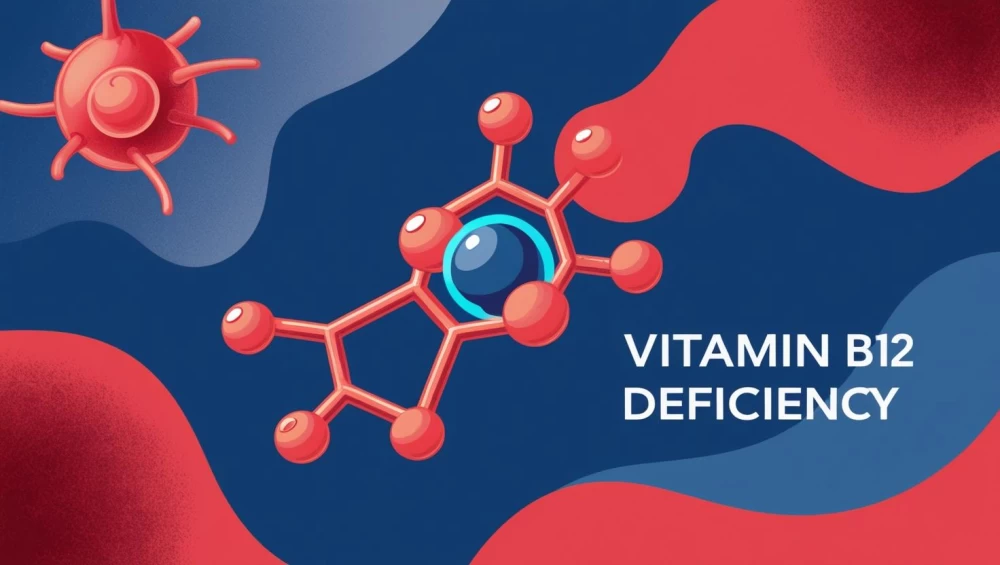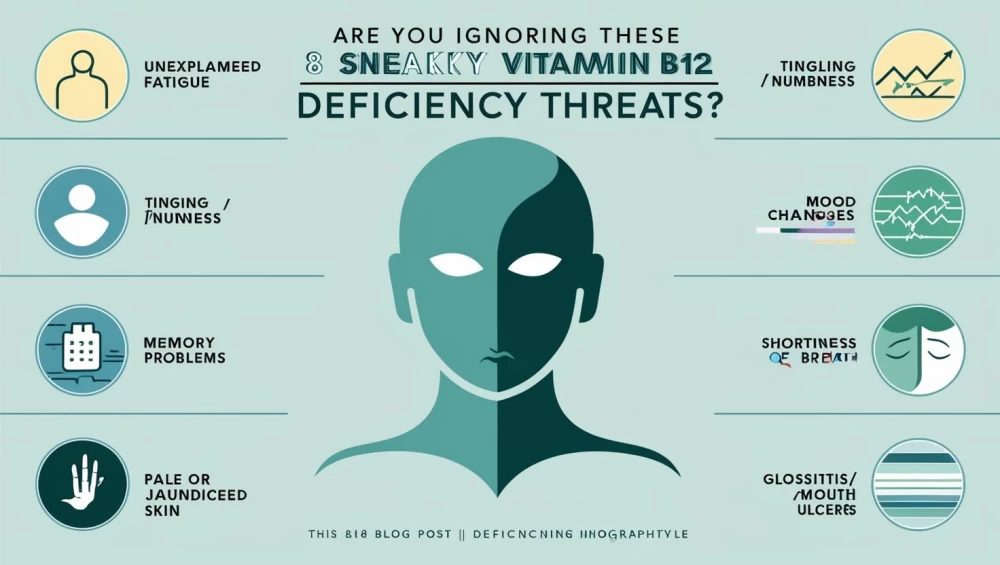
- 1st April 2025
Table of Contents
- What is Vitamin B12 & Why Is It Important?
- 8 Sneaky Vitamin B12 Deficiency Threats
- 1. Unexplained Fatigue & Weakness
- 2. Tingling or Numbness in Hands & Feet
- 3. Mood Changes, Anxiety, and Depression
- 4. Memory Problems & Brain Fog
- 5. Pale or Jaundiced Skin
- 6. Shortness of Breath & Dizziness
- 7. Glossitis & Mouth Ulcers
- 8. Vision Problems & Blurred Vision
- Who is at Risk of B12 Deficiency?
Vitamin B12 is an essential nutrient that plays a crucial role in energy production, brain function, and the formation of red blood cells. It helps convert the food you eat into usable energy, supports the nervous system, and is vital for creating healthy red blood cells that transport oxygen throughout the body. Despite its importance, a deficiency in vitamin B12 often goes unnoticed because its early symptoms can be subtle and easily confused with signs of aging, stress, or other minor health issues.
Certain lifestyle factors, dietary choices, and medical conditions can increase your risk of developing a vitamin B12 deficiency. For example, individuals following vegetarian or vegan diets may not get enough B12, as it is predominantly found in animal products. Additionally, people with digestive issues such as Crohn’s disease, celiac disease, or those who have undergone bariatric surgery may experience difficulties absorbing this vitamin. Even as we age, our bodies can become less efficient at absorbing B12, further elevating the risk.
In this blog, we’ll explore eight sneaky signs of vitamin B12 deficiency that many people tend to ignore. By understanding these subtle warning signals, you’ll be better equipped to recognize the early indicators of deficiency, enabling you to take action and safeguard your health before more serious complications arise.
What is Vitamin B12 & Why Is It Important?
Vitamin B12, also known as cobalamin, is a vital water-soluble vitamin that plays multiple crucial roles in maintaining overall health. One of its most important functions is supporting the nervous system; it helps maintain the myelin sheath that surrounds nerve fibers, ensuring proper signal transmission throughout the body. Without adequate B12, nerve cells can deteriorate, leading to numbness, tingling, or even cognitive issues.
Another essential role of Vitamin B12 is in red blood cell production. B12 is necessary for the proper formation and maturation of red blood cells, which transport oxygen to various tissues and organs. A deficiency in B12 can lead to megaloblastic anemia, characterized by the production of abnormally large and ineffective red blood cells, causing fatigue and weakness.
Furthermore, Vitamin B12 is integral to DNA synthesis. It acts as a cofactor in the creation of genetic material, which is critical for cell division and repair. This function is especially important for rapidly dividing cells in the body, such as those in the bone marrow and gastrointestinal tract.
Additionally, Vitamin B12 contributes to brain and heart health by reducing levels of homocysteine—a compound linked to heart disease—and supporting cognitive function. Maintaining adequate B12 levels can therefore help reduce the risk of cardiovascular issues and age-related cognitive decline.
The daily recommended intake of Vitamin B12 for most adults is around 2.4 micrograms, though requirements may vary based on age, lifestyle, and health conditions. Over time, inadequate consumption or poor absorption of Vitamin B12 can lead to a deficiency, with symptoms gradually emerging. Recognizing these signs early is essential, as the deficiency may persist silently, gradually impairing nerve function and overall vitality if not addressed.
8 Sneaky Vitamin B12 Deficiency Threats

1. Unexplained Fatigue & Weakness
Vitamin B12 plays a critical role in energy production by aiding in the formation of ATP, the primary energy molecule in our cells. When your body is low on B12, you may experience persistent fatigue and weakness, even after adequate rest. The deficiency affects your metabolism at a cellular level, reducing the efficiency of energy conversion from the food you consume.
Possible Solutions:
Dietary Changes: Incorporate B12-rich foods such as lean meats, fish, dairy products, and fortified cereals into your daily meals.
Supplements: If dietary intake isn’t enough, consider B12 supplements or injections as recommended by a healthcare professional.
Regular Testing: Routine blood tests can help monitor your levels and ensure that any fatigue is not a sign of deeper nutritional issues.
2. Tingling or Numbness in Hands & Feet
A common, yet often overlooked, symptom of Vitamin B12 deficiency is paresthesia—characterized by a tingling or numb sensation in the extremities. B12 is essential for maintaining the health of your nerve cells and the myelin sheath, the protective covering around nerves. Without sufficient B12, nerve signals can become erratic or slowed, leading to these uncomfortable sensations.
Possible Solutions:
Increase B12 Intake: Boost your intake through diet and supplements to restore nerve function.
Absorption Checks: Conditions like pernicious anemia or gastrointestinal issues can impede B12 absorption; consulting with your doctor for proper tests is important.
Monitor Symptoms: Keep track of any progression in symptoms and seek early intervention to prevent long-term nerve damage.
3. Mood Changes, Anxiety, and Depression
Vitamin B12 is also crucial for producing neurotransmitters such as serotonin and dopamine, which regulate mood and emotional balance. When B12 levels drop, it can disrupt the synthesis of these chemicals, leading to mood swings, increased anxiety, and even depression. The link between low B12 and mental health is significant, especially for individuals who are already vulnerable to mood disorders.
Possible Solutions:
Balanced Diet: Include B12-rich foods like eggs, dairy, and fortified nutritional yeast to support neurotransmitter production.
Supplementation: Consider a daily B12 supplement to help stabilize mood, particularly if you’re at risk for or currently experiencing depressive symptoms.
Professional Support: In cases of severe mood disturbances, combining nutritional therapy with professional mental health support can be highly beneficial.
4. Memory Problems & Brain Fog
A deficiency in Vitamin B12 can impair cognitive function, leading to memory lapses, reduced concentration, and an overall feeling of brain fog. B12’s role in DNA synthesis and nerve health means that prolonged low levels can contribute to serious cognitive decline and even increase the risk of dementia over time.
Possible Solutions:
Nutrient-Rich Diet: Focus on a diet that not only includes B12 but also other brain-boosting nutrients like omega-3 fatty acids, found in fish and flaxseeds.
Routine Supplements: Regular supplementation with B12 can help clear up brain fog and improve overall cognitive performance.
Lifestyle Adjustments: Engaging in mental exercises, adequate sleep, and stress-reducing activities like meditation can support brain health and counteract cognitive decline.
5. Pale or Jaundiced Skin
Vitamin B12 is integral to red blood cell production, which directly affects skin health. A deficiency can lead to megaloblastic anemia, where red blood cells are larger but fewer in number and less efficient at carrying oxygen. This can manifest as pale skin or even a slight yellow tint (jaundice) due to the body’s inability to properly process hemoglobin.
Possible Solutions:
Iron and B12 Together: Ensure your diet includes both iron and Vitamin B12. Foods like lean red meat, poultry, and leafy greens are beneficial.
Supplementation: For individuals with anemia related to B12 deficiency, combining iron and B12 supplements under medical supervision may help restore healthy skin tone and vitality.
Medical Consultation: If you notice persistent changes in your skin’s appearance, a consultation with your healthcare provider can help determine if anemia or another deficiency is the cause.
6. Shortness of Breath & Dizziness
Shortness of breath and dizziness are symptoms often linked to anemia caused by low Vitamin B12 levels. Anemia reduces the oxygen-carrying capacity of your blood, which can leave you feeling lightheaded or short of breath during everyday activities. These symptoms are sometimes mistaken for conditions like low blood pressure or iron deficiency, making proper diagnosis essential.
Possible Solutions:
Nutritional Assessment: A thorough blood test can help identify if your symptoms are due to B12 deficiency.
Balanced Diet: Incorporate a balanced diet with adequate B12, iron, and folate to support healthy red blood cell production.
Targeted Treatment: If diagnosed with anemia, follow your doctor’s recommendations on dietary changes and supplement protocols to alleviate symptoms.
7. Glossitis & Mouth Ulcers
Glossitis, or inflammation of the tongue, along with mouth ulcers, are lesser-known but telling signs of Vitamin B12 deficiency. The lack of B12 can cause the tongue to become swollen, red, and sore, making it uncomfortable to eat or speak. These oral symptoms are frequently dismissed or attributed to other causes, yet they can serve as early indicators of an underlying nutritional imbalance.
Possible Solutions:
Dietary Adjustments: Enhance your diet with B12-rich foods such as dairy, meat, and fortified cereals to improve oral health.
Supplement Use: Regular supplementation may help reduce inflammation and prevent the recurrence of mouth ulcers.
Oral Hygiene: Maintaining good oral hygiene and consulting with a dentist can help manage symptoms while addressing the root cause through improved B12 levels.
8. Vision Problems & Blurred Vision
Vitamin B12 is essential for maintaining the health of the optic nerve, which is responsible for transmitting visual information from the eyes to the brain. Deficiency in B12 can lead to vision problems such as blurred vision, light sensitivity, and in severe cases, optic nerve damage. These symptoms, though less common, are a serious warning sign that the body is not receiving adequate nutrition.
Possible Solutions:
Nutritional Interventions: Incorporate foods rich in B12 and other eye-friendly nutrients like lutein and zeaxanthin, which support overall eye health.
Supplements: If you experience vision issues alongside other symptoms of B12 deficiency, a B12 supplement may help restore proper nerve function in the eyes.
Professional Evaluation: Early consultation with an eye specialist is crucial to assess the extent of any vision impairment and determine if nutritional supplementation can reverse the damage.
Who is at Risk of B12 Deficiency?
Vitamin B12 deficiency isn’t a one-size-fits-all issue—it affects some groups more than others. Vegans and vegetarians are particularly at risk since vitamin B12 is primarily found in animal products. Without regular consumption of dairy, eggs, or meat, these individuals need to rely on fortified foods or supplements to meet their daily requirements.
Older adults are another vulnerable group because our ability to absorb vitamin B12 tends to decline with age. This decreased absorption can leave seniors more susceptible to deficiency even if their diet appears balanced.
People suffering from digestive issues such as IBS, Crohn’s disease, or celiac disease often struggle with nutrient absorption, making it challenging for them to obtain sufficient B12. Additionally, pregnant and breastfeeding women have increased nutritional demands to support both their own health and the development of their baby, putting them at higher risk if their diet isn’t well-managed.
Finally, those using acid-reducing medications may face reduced absorption of vitamin B12, as a less acidic stomach environment hinders the release of this essential nutrient from food. Recognizing these risk factors is key to proactive prevention and effective management.
How to Prevent & Treat Vitamin B12 Deficiency
Preventing and treating vitamin B12 deficiency begins with a nutrient-rich diet. Incorporate foods naturally high in B12—such as lean meats, eggs, dairy, and fish—as well as fortified cereals and plant-based milk alternatives. These dietary sources provide the foundation needed to maintain healthy B12 levels.
For those who struggle to get sufficient vitamin B12 from their diet—such as vegans, older adults, or individuals with absorption issues—supplements can be a valuable solution. Oral supplements, including sublingual tablets, are commonly recommended. In cases of severe deficiency or when absorption is impaired, B12 injections administered by a healthcare provider may be necessary to quickly restore adequate levels.
Regular testing is crucial for monitoring your vitamin B12 status. Routine blood tests help detect deficiency early, allowing you to adjust your dietary intake or supplementation accordingly. This proactive approach is especially important for individuals at higher risk, as early intervention can prevent complications like nerve damage or anemia.
In addition to diet and supplementation, certain lifestyle modifications can enhance B12 absorption. Maintaining a healthy digestive system through regular exercise, stress management, and limiting alcohol intake can support nutrient absorption. If you are on medications like acid reducers that may interfere with B12 absorption, consult with your healthcare provider about possible adjustments or supplementation strategies.
A balanced approach that combines a B12-rich diet, targeted supplementation, regular monitoring, and supportive lifestyle habits is key to preventing and treating vitamin B12 deficiency effectively. This comprehensive strategy not only helps maintain energy levels and cognitive function but also safeguards overall health.
Recognizing the early signs of Vitamin B12 deficiency is crucial for preventing long-term health issues. This condition can lead to a range of complications—from chronic fatigue and nerve damage to cognitive decline and anemia—if not addressed promptly. By paying attention to subtle symptoms such as unexplained tiredness, tingling in the extremities, mood fluctuations, and even vision problems, you can take proactive steps to safeguard your health.
It's important to assess your personal risk factors, whether you're following a plant-based diet, experiencing digestive issues, or using medications that may hinder nutrient absorption. If you suspect you might be deficient in Vitamin B12, consider getting a blood test and consulting with your healthcare provider for a proper diagnosis and treatment plan. Taking early action can make a significant difference in your overall well-being and prevent more serious complications in the future.
Are you experiencing any of these symptoms? Take charge of your health today!














